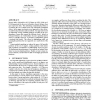Free Online Productivity Tools
i2Speak
i2Symbol
i2OCR
iTex2Img
iWeb2Print
iWeb2Shot
i2Type
iPdf2Split
iPdf2Merge
i2Bopomofo
i2Arabic
i2Style
i2Image
i2PDF
iLatex2Rtf
Sci2ools
RECOMB
2001
Springer
2001
Springer
Class discovery in gene expression data
Recent studies (Alizadeh et al, [1]; Bittner et al,[5]; Golub et al, [11]) demonstrate the discovery of putative disease subtypes from gene expression data. The underlying computational problem is to partition the set of sample tissues into statistically meaningful classes. In this paper we present a novel approach to class discovery and develop automatic analysis methods. Our approach is based on statistically scoring candidate partitions according to the overabundance of genes that separate the different classes. Indeed, in biological datasets, an overabundance of genes separating known classes is typically observed. we measure overabundance against a stochastic null model. This allows for highlighting subtle, yet meaningful, partitions that are supported on a small subset of the genes. Using simulated annealing we explore the space of all possible partitions of the set of samples, seeking partitions with statistically significant overabundance of differentially expressed genes. We ...
Automatic Analysis Methods | Computational Biology | Putative Disease Subtypes | RECOMB 2001 | Stochastic Null Model |
Related Content
| Added | 03 Dec 2009 |
| Updated | 03 Dec 2009 |
| Type | Conference |
| Year | 2001 |
| Where | RECOMB |
| Authors | Amir Ben-Dor, Nir Friedman, Zohar Yakhini |
Comments (0)

